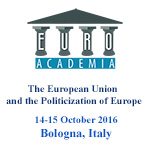Euroacademia Conferences
 Europe Inside-Out: Europe and Europeanness Exposed to Plural Observers (9th Edition) April 24 - 25, 2020
Europe Inside-Out: Europe and Europeanness Exposed to Plural Observers (9th Edition) April 24 - 25, 2020 Identities and Identifications: Politicized Uses of Collective Identities (9th Edition) June 12 - 13, 2020
Identities and Identifications: Politicized Uses of Collective Identities (9th Edition) June 12 - 13, 2020 8th Forum of Critical Studies: Asking Big Questions Again January 24 - 25, 2020
8th Forum of Critical Studies: Asking Big Questions Again January 24 - 25, 2020 Re-Inventing Eastern Europe (7th Edition) December 13 - 14, 2019
Re-Inventing Eastern Europe (7th Edition) December 13 - 14, 2019 The European Union and the Politicization of Europe (8th Edition) October 25 - 26, 2019
The European Union and the Politicization of Europe (8th Edition) October 25 - 26, 2019 Identities and Identifications: Politicized Uses of Collective Identities (8th Edition) June 28 - 29, 2019
Identities and Identifications: Politicized Uses of Collective Identities (8th Edition) June 28 - 29, 2019 The European Union and the Politicization of Europe (7th Edition) January 25 - 26, 2019
The European Union and the Politicization of Europe (7th Edition) January 25 - 26, 2019 7th Forum of Critical Studies: Asking Big Questions Again November 23 - 24, 2018
7th Forum of Critical Studies: Asking Big Questions Again November 23 - 24, 2018 Europe Inside-Out: Europe and Europeanness Exposed to Plural Observers (8th Edition) September 28 - 30, 2018
Europe Inside-Out: Europe and Europeanness Exposed to Plural Observers (8th Edition) September 28 - 30, 2018 Identities and Identifications: Politicized Uses of Collective Identities (7th Edition) June 14 - 15, 2018
Identities and Identifications: Politicized Uses of Collective Identities (7th Edition) June 14 - 15, 2018
Politicization and Crises of European Integration: For a Re-Politicization of the European Union
-
-

-
Presentation speakers
- Jean F. Crombois, American University in Bulgaria
- Download presentation
Abstract:
Since the late 1980s, the European integration process if facing a growing politicization that also challenges its very theoretical bases as envisaged by neo-functionalism and the liberal-intergovernmentalism. According the authors, Liesbeth Hooghes and Gary Marks, such politicization reflects a post-functionalist moment in the European integration process. Our paper seeks to assess Hooghes and Mark’s thesis through two case studies: the Euro crisis and the migrant crisis. In conclusion, our paper argues that the negative impact of such politicization has been over-estimated by Hooghes and Marks while its positive impact has been under-estimated. In other words, the possibility of a re-politicization of the EU integration project. The condition, however, to capitalize on its positive impact lies in the need for the EU to change its approach, from technocratic one to what we call a more pragmatist one.
-
Related Presentations

Bologna’s Iconography. The Representation of the City in the Paintings of Pinacoteca Nazionale
- Denise Tamborrino

Diplomatic Instruments: U.S. Symphony Orchestras And The Cold War
- Jonathan Rosenberg

Theorizing European Disintegration in Times of Complexity
- Senka Neuman Stanivukovic

The Brexit Vote: Conceptualizing European (Dis)Integration
- Antonio Sergio

Behind the Synthetic Curtain: The Politics of Plastic in Czechoslovakia
- Roksana Filipowska













